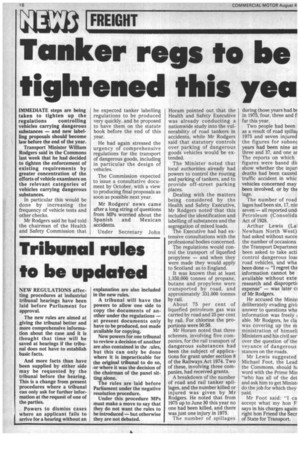Tanker regs to be tightened this yea
Page 20

If you've noticed an error in this article please click here to report it so we can fix it.
IMMEDIATE steps are being taken to tighten up the regulations controlling vehicles carrying dangerous substances — and new Labelling proposals should become law before the end of the year.
Transport. Minister William Rodgers said in the Commons last week that he had decided to tighten the enforcement of existing requirements by greater concentration of the efforts of vehicle examiners on the relevant categories of vehicles carrying dangerous substances.
In particular this would be done by increasing the frequency of vehicle tests and other checks.
Mr Rodgers said he had told the chairman of the Health and Safety Commission that he expected tanker labelling regulations to be produced very quickly, and he proposed to have them, on the statute book before the end of this year.
He had again stressed the urgency of comprehensive regulations for the transport of dangerous goods, including in particular the design of vehicles.
The Commission expected to issue a consultative document by October, with a view to producing final proposals as soon as possible next year.
Mr Rodgers' news came after a long string of questions from MPs worried about the Spanish and Mexican accidents.
Under Secretary John Horam pointed out that the Health and Safety Executive was already conducting a nationwide study into the vulnerability of road tankers in accidents, while Mr Rodgers said that statutory controls over parking of' dangerous goods vehicles would be extended.
The Minister noted that local authorities already had powers to control the routing and parking of tankers, and to provide off-street parking places.
Dealing with the matters being considered by the Health and Safety Executive, Mr Rodgers noted that this included the identification and labelling of substances and the segregation of mixed loads.
The Executive had had extensive consultations with the professional bodies concerned.
The regulations would control the transport of liquefied propylene — and when they were made they would apply to Scotland as to England.
It was known that at least 1,350,000 tonnes of propane, butane and propylene were transported by road, and approximately 331,000 tonnes by rail.
About 75 per cent of liquefied petroleum gas was carried by road and 25 per cent by rail. For chlorine the proportions were 50:50. Mr Horam noted that three schemes, involving five companies, for the rail transport of dangerous substances had been the subject of applications for grant under section 8 of the Railways Act 1974. Two of these, involving three companies, had received grants.
A breakdown of the number of road and rail tanker spillages, and the number killed or injured was given by Mr Rodgers. He noted that from 1975 up to June 30 this year no one had been killed, and there was just one injury in 1975.
The number of spillages during those years had be in 1975, four, three and fi far this year.
Two people had been as a result of road spillal 1975 and seven injured the figures for subseq years had been nine an three and 37, and one or The reports on which figures were based di( show whether the injuri deaths had been caused traffic accident in whic vehicles concerned may been involved, or by the lage.
The number of road lages had been six, 17, nin seven — all reported undi Petroleum (Consolida Act of 1928.
Arthur Lewis (Lal Newham North West) had asked without succe the number of occasions the Transport Departmer been asked to take acti control dangerous loa( road vehicles, and wha been done -7 "I regret tha information cannot be available without extei research and disproprth expense" — was later ci of Mr Rodgers.
He accused the Minisi deliberately evading givii answer to questions whe information was freely able. Mr Rodgers, he cla was covering up the m ministration of himsell Ministers and his civil ser over the question or the veyance of dangerous stances on the roads.
Mr Lewis suggested. Michael Foot, the Lead the Commons, should hi word with the Prime Min "who has all of the det and ask him to get Minist4 do the job for which they paid.
Mr Foot said: "1 ca accept what my hon F: says in his charges again: right hon Friend the Secr of State for Transport.




















































































































